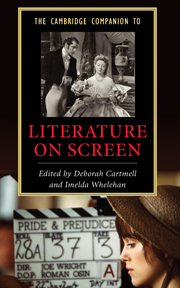Book contents
- Frontmatter
- Introduction - Literature on screen: a synoptic view
- Part One Theories of Literature on Screen
- Part Two History and Contexts
- Part Three Genre, Industry, Taste
- Part Four Beyond the "Literary"
- 13 Classic literature and animation: all adaptations are equal, but some are more equal than others
- 14 High fidelity? Music in screen adaptations
- 15 From screen to text: novelization, the hidden continent
- 16 A practical understanding of literature on screen: two conversations with Andrew Davies
- Further reading
- Index
- Series List
16 - A practical understanding of literature on screen: two conversations with Andrew Davies
from Part Four - Beyond the "Literary"
Published online by Cambridge University Press: 28 September 2007
- Frontmatter
- Introduction - Literature on screen: a synoptic view
- Part One Theories of Literature on Screen
- Part Two History and Contexts
- Part Three Genre, Industry, Taste
- Part Four Beyond the "Literary"
- 13 Classic literature and animation: all adaptations are equal, but some are more equal than others
- 14 High fidelity? Music in screen adaptations
- 15 From screen to text: novelization, the hidden continent
- 16 A practical understanding of literature on screen: two conversations with Andrew Davies
- Further reading
- Index
- Series List
Summary
Andrew Davies is, undoubtedly, one of the most successful and prolific writers and adaptors for television and cinema; included in his oeuvre are A Very Peculiar Practice (1986, 1988), Pride and Prejudice (1995), Tipping the Velvet (2002), The Way We Live Now (2001), Bridget Jones's Diary (1996), and Bleak House (2005). Although best known for his work in television and cinema, Andrew Davies is also a writer for both adults and children and has written for the stage and radio. He spoke to Deborah Cartmell and Imelda Whelehan twice; over lunch in Birmingham and in a public conversation at De Montfort University, Leicester. Speaking about authorship, fidelity, audiences, casting, and his past and current projects, Davies offers insight into his distinctive “televisual” aesthetic.
- Type
- Chapter
- Information
- The Cambridge Companion to Literature on Screen , pp. 239 - 251Publisher: Cambridge University PressPrint publication year: 2007
- 4
- Cited by

